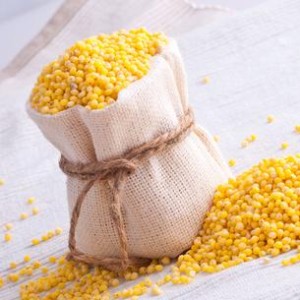Organic Millet is a wonderfully tasty grain. Millet is rich in B vitamins, especially niacin, B6 and folic acid, calcium, iron, potassium, magnesium, and zinc. To cook: Heat 2 parts millet to 5 parts water and boil for 30-35 minutes.
Contents
Uses
- Today, millet continues to be a staple for a third of the world’s population.
- Ground millet is used in flatbreads, such as Indian roti and Ethiopian and Eritrean injera (made from teff, a variety of millet).
- In Eastern Africa, millet is used to make beer. It is also an ingredient in Eastern European fermented drinks and porridges.
Benefits
- Increase Your Heart Health: Millet is one of the best possible grains to add to your diet if you want to protect your heart, which is something that everyone can relate to. Millet is a rich source of magnesium, which is an important mineral for reducing blood pressure and the risk of heart attacks of strokes, particularly in the case of atherosclerosis. Millet is also a great source of potassium, which further keeps blood pressure low by acting as a vasodilator. Reducing your blood pressure and optimizing your circulatory system is one of the best ways to protect your cardiovascular health. Furthermore, the plant lignans found in millet can be converted to animal lignans by the microflora in our digestive system, and those animal lignans have been shown to protect against certain chronic diseases, like cancer and heart disease.
- Cholesterol Levels in Check: Cholesterol levels go hand-in-hand with heart health, so the high fiber levels in millet make for an ideal cholesterol-lowering approach. Dietary fiber actually eliminates dangerous “bad cholesterol” (LDL) from the system, while promoting the effects of “good cholesterol (HDL).
- Protection Against Diabetes: Diabetes is a disease found in millions of people around the world. Millet is a beneficial food staple in many developing countries (where diabetes is less frequently found), perhaps because one of the effects of millet is a reduced chance of Type 2 diabetes, thanks to the significant levels of magnesium found in this particular grain. Magnesium is considered one of the most important minerals for increasing the efficiency of insulin and glucose receptors in the body, thereby preventing this disease. A 30% reduction in diabetes has been seen in populations divided between diets with or without magnesium.
- Digestive Health: As most fiber-rich foods boast, millet can help move your gastrointestinal system along and eliminate problems like constipation, excess gas, bloating, and cramping. By regulating your digestive process, you also improve your nutrient retention and reduce your chance of more serious gastrointestinal conditions like gastric ulcers or colon cancer. Regular digestion and elimination of waste also helps to optimize your kidney, liver, and immune system health, as those organ systems are closely related to the body’s metabolic activities.
- Cancer Risk: Recent research has revealed fiber to be one of the best and easiest ways to prevent the onset of breast cancer in women. In fact, women can reduce their chances of breast cancer by more than 50% by eating more than 30 grams of fiber every day. Given that breast cancer is one of the most common and deadliest forms of cancer, this is advice that every woman should hear!
- Detoxify the Body: Many of the antioxidants found in millet, in addition to their beneficial impact on neutralizing free radicals, which can cause cancer, they can also clean up other toxins from your body, such as those in your kidney and liver. Quercetin, curcumin, ellagic acid, and various other beneficial catechins can help to rid your system of any foreign agents and toxins by promoting proper excretion and neutralizing enzymatic activity in those organs.
- Respiratory System:Research has come to light showing that millet can significantly improve the quality of life for people suffering from childhood asthma, and can also prevent it from developing in the first place. Although some of the evidence is controversial, it is shown that significantly less wheezing and asthma attacks (by more than 15%) was seen in children who had large intakes of grains like millet. However, as wheat is a common allergen that is associated with asthma and wheezing, millet does not have the same components and does not have this negative effect.
Cautions
- Given the modern stresses on our body, particularly to our glandular system, the excessive work needed to properly digest and process millet may be damaging. Consider speaking to your doctor about your glandular and thyroid health before making a major shift to a millet-heavy diet.
Interactions
- None enough information is available. Please consult your doctor.
Other names
n/a
References
Source: Organic Facts, https://www.organicfacts.net/health-benefits/cereal/health-benefits-of-millet.html
Thekitchn, http://www.thekitchn.com/good-grains-what-is-millet-67713

